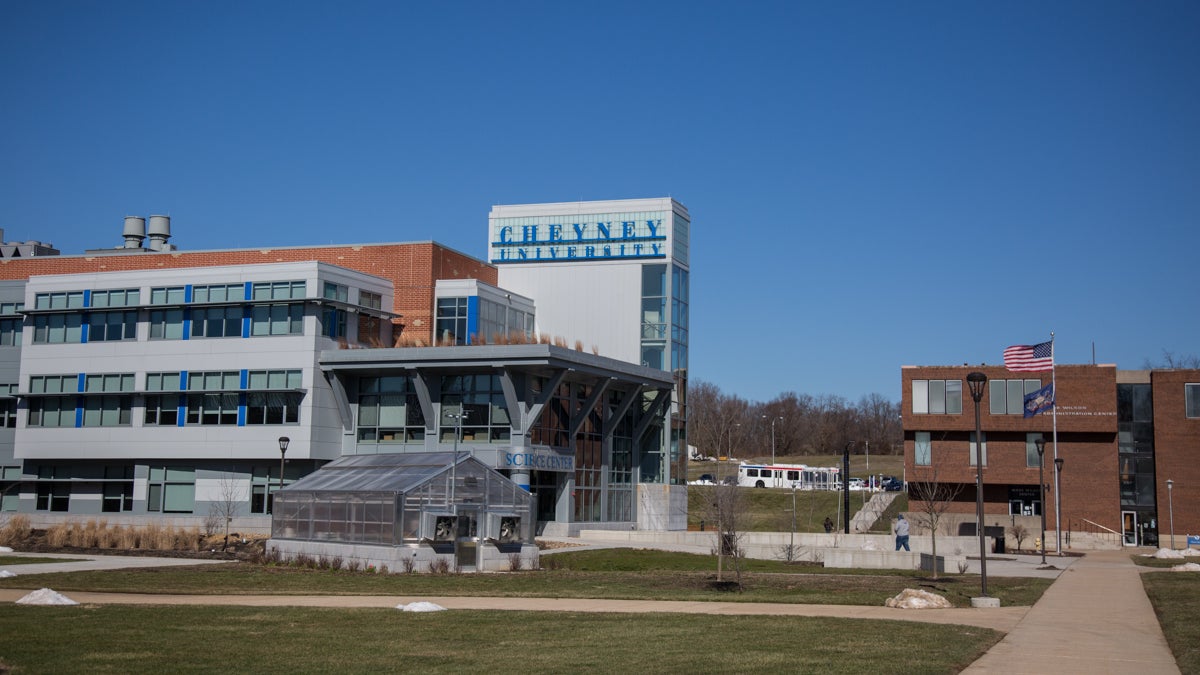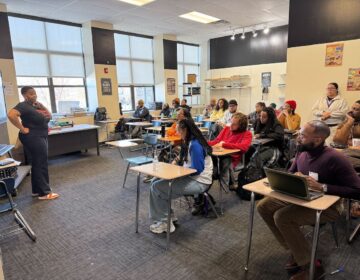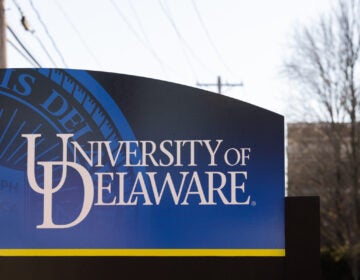Report on Pa. higher ed skips closure talk, but says governance needs overhaul

Cheyney University of Pennsylvania is a public, co-educational historically black university that is a member of the Pennsylvania State System of Higher Education. (Emily Cohen for WHYY, file)
The governing board of Pennsylvania’s 14 state-owned universities is part of the problem and not the solution, according to a new report.
The outside consulting firm National Center on Higher Education Management Systems was asked by the Board of Governors for the Pennsylvania State System of Higher Education to make recommendations to help turnaround the state-owned schools, which face rising costs as student enrollment drops. It did not, however urge merging or closing any of the colleges as had been discussed.
Dennis Jones, president emeritus of the consulting firm, said even replacing the board is not enough to fix things. He said university leaders, state lawmakers also had a hand in letting things get to this low-point.
“There is nobody without culpability in this room. All parties have had a hand in digging the hole that the state system finds itself in,” he said. “All the parties are going to have to work together to dig their way out of that. And if you don’t have the will and if you don’t have the interest in collaboration, then nothing we say today is going to matter.”
Jones said the root cause of the financial turmoil and dwindling enrollment is an inadequate leadership structure.
“First of all, governance is not up to the current challenges. I think this is the core of what we’ve concluded,” he said. “The way the system is now structured…does not work when you’re faced with the current set of challenges.”
He said that structure worked when the system was first created, but too many layers of administration have overshadowed teachers and their unions.
He recommended replacing the Board of Governors with a Board of Regents instead, made up of members who have no political ties.
Most of the current board members —17 of the 20 members — were appointed by the governor or state lawmakers. Jones said he believed it was the only board in the country with this make-up.
That shift would require a change in state law.
Jones pointed out the current leadership model is “very twisted and uncertain about who is in charge of what” and needs to be streamlined.
“Top down doesn’t work in Pennsylvania or any other state,” he said.
System-wide enrollment has declined for six straight years, a 12 percent drop since 2010, along with rising costs and decreasing or stagnant public funding.
System expenses exceed income, and Jones said it’s not feasible to keep raising tuition to cover gaps, which is exactly what was proposed earlier in the day by PASSHE’s finance committee, which recommended a 3.5 percent tuition hike for the next year.
The firm visited all 14 campuses, held more than 120 meetings and more than 800 individuals offered comments through the project website.
Other recommendations included: reconfiguring universities facing the most severe sustainability challenges; bringing more faculty into academic policy conversations; creating a statewide organization responsible for coordinating all of PA’s higher ed institutions; and having the state legislature consider permitting the state-owned schools to offer buyouts or early retirement to allow for better long range planning.
Ken Mash, president of the Association of Pennsylvania State College and University Faculties labor union, said the recommendations are well-meaning, but the union has a different focus.
“Our concern remains that we think that moving the deck chairs on a sinking ship is not necessarily the only answer,” Mash said. “There are certainly recommendations that they have made which will be fruitful, particularly when it comes to matters of cooperation. But ultimately this commonwealth has to make a decision about whether college is going to be affordable.”
Pennsylvania ranks 46 out of 50 states in per-student funding for public higher education.
“I think the problem that our universities are facing right now is that we are just not as affordable as we should be,” Mash said. “Tuition has gone up. Fees have gone up. The private universities are competitive cost-wise with our universities. We’re supposed to be the universities that serves the working class.”
He said until there’s a commitment from the commonwealth, any changes will ultimately lead to cutting resources and less opportunities for students.
“Students are going to be continuing to either winding up being in debt for decades, giving money to banks instead of putting money back into the economy or making choices between food and books or just making the decision not to come to the universities at all,” the union president said.
Jones also pointed out the state system under-serves non-traditional students — the fastest growing population in higher education — and Pennsylvania lags in serving them compared to the rest of the country.
Decision-making “based on politics and special interests” needs to shift, he noted, to one focused on the “best interest of students in the state and its regions.”
He said it will take the combined efforts of all to bring the taxpayer-funded universities back from the edge of financial ruin.
And there’s no easy fix, according to Jones.
“There were a lot of folks when we went around that were looking for silver bullets. You don’t have silver bullets in higher education. We’ve used all those up,” he said. “There are no simple answers. There’s just good intentions and consistent application in pursuit of service to the students that really need to be served.”
Next steps include the board getting more feedback from faculty, staff and students and others. Then coming up with immediate, mid-term and long-term options, according to a statement the state system released.
State lawmakers are also conducting a study and issuing a report related to the sustainability and viability of the state system due by the end of the year.
PASSHE universities include: Bloomsburg, California, Cheyney, Clarion, East Stroudsburg, Edinboro, Indiana, Kutztown, Lock Haven, Mansfield, Millersville, Shippensburg, Slippery Rock and West Chester.
WHYY is your source for fact-based, in-depth journalism and information. As a nonprofit organization, we rely on financial support from readers like you. Please give today.




